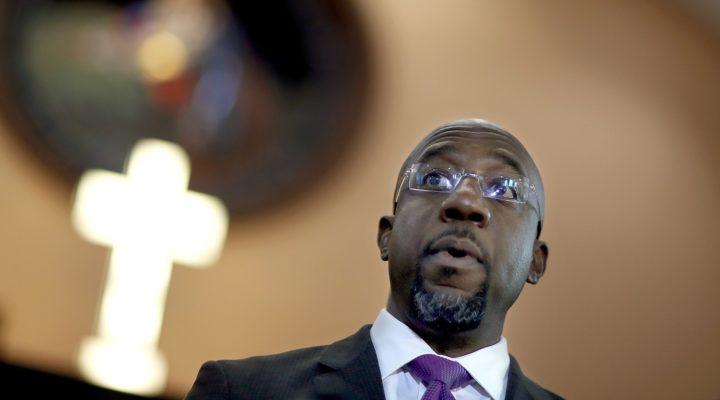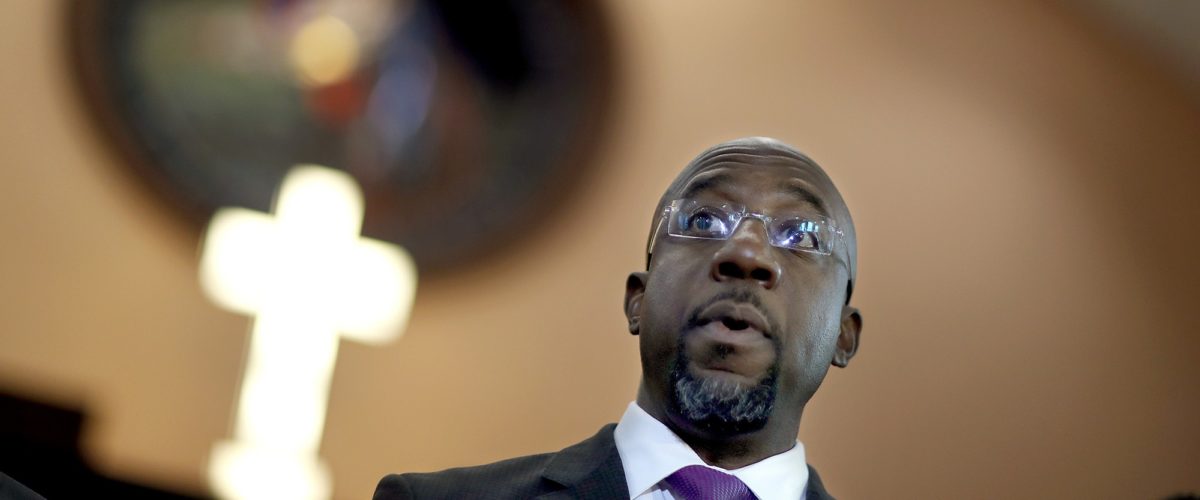Back in 2011, Raphael Warnock, pastor of Ebenezer Baptist Church in Atlanta (and currently in a runoff for one of Georgia’s two U.S. Senate seats), preached a sermon drawn from the Gospel of Matthew about whether a person could serve two masters: “America, nobody can serve God and the military. You can’t serve God and money. You cannot serve God and mammon at the same time. America, choose ye this day who you will serve.”
It was, I must say, a fairly traditional reading of the Scripture: Jesus taught that anything we put in front of God, anything we revere more than God, becomes God to us, whether that’s money or country or work or security. The Scripture says this; the 2000-year discourse of the church says this; our own honest understanding of the call of Christ says this. Fox News itself reported that Warnock’s message was “call(ing) on churchgoers, and America as a whole, to turn away from the pursuit of power and wealth in favor of a life of service.”
So I was surprised — and then not so surprised — to discover the growing thunder of Republican criticism of Warnock and his understanding of faith in late 2020. Republican Sen. Marsha Blackburn (Tenn.) tweeted that this sermon was “radical, anti-American” and “disqualifying.” Other Republicans, according to Politico were “taking to the airwaves and social media to frame the pastor as a radical and tool of the ‘extremist’ left.” A group of veterans in Georgia called the sermon (more particularly the line “nobody can serve God and the military”) shameful, and called on Warnock to drop out of the race.
“We would not be having this same conversation about a white preacher calling America to account for its sins.”
On the one hand, I know this has become a partisan issue where Warnock’s theological conclusion is being willfully misconstrued as an attack on military service. But on the other, I know we would not be having this same conversation about a white preacher calling America to account for its sins. I know that because thousands of white pastors offer similar messages every week. I know that because I heard that message over and over during the first 18 years of my life.
The only two differences are these: Warnock and many of these white preachers are condemning different kinds of American moral failings.
And Warnock, on the stump and from the pulpit, is calling on white Americans to repent of the sins of racism and inequality, and many white people do not want to hear these words from any Black man, even a Black man of God.
It’s not just Jeremiah Wright who has re-emerged into our national political conversation since his 2008 repudiation by Barack Obama (a sad decision that abdicated the real moral engagement and teaching the candidate could have offered on this topic by abandoning his relationship with Wright). It’s Martin Luther King Jr., who previously occupied the pulpit of Ebenezer Baptist and constantly called America and the church to account.
“One representative letter simply described King as ‘the most dangerous man in America.’”
In archival research at the LBJ Presidential Library for my last book, I discovered a flood of letters, telegrams and telephone messages sent to the president enjoining him not to listen to MLK’s message or lean into any of the criticisms he offered. One representative letter simply described King as “the most dangerous man in America.”
But it’s also any number of other preachers and theologians of color who challenge white people by holding up a mirror to their nation, their faith and their God. Back in the spring, my graduate seminar at Baylor read Black and Liberation theologians. They understood logically how the life experiences and cultural location of these theologians accounted for their understandings of God, of grace, of justice. But one of my smartest and most compassionate students nonetheless recoiled from James H. Cone’s teachings, feeling judged and convicted by them. “He seems so angry,” this student said.
So now here we are, once again arguing about whether Black theology or Liberation theology is somehow un-American because it is critical of our nation.
So now here we are, listening to an old sermon from King’s successor about putting God first, and white people are feeling fragile and threatened, and good white Christians are working to keep this vision of God’s justice from disturbing the moral fabric of their universes.
It feels like white Christians and politicians have to do this every so often as they prepare to sail into the West: to defend themselves, the white Church, the idols they’ve made into Gods.
To say, as many have said to me, “I’m not personally racist, so I’m not part of the problem.”
Or to say, “I don’t even know any Black people, so how can I be racist?”
American history is jam-packed with preachers who brought difficult messages to American believers, often saying that the world, the culture or their communities were broken, and that if changes weren’t made, it would mean the end of things. We have an entire genre of sermon, the jeremiad, preached in America by cultivated Puritan Mathers and by unschooled farm boys, by novelists and essayists.
We expect — in cultural and political and religious discourse — for our leaders to lament our missteps and call us to live up to our core beliefs.
It’s only when the people condemning our failures and calling for our transformation don’t look like us that we feel threatened and convicted in our skin.
The Book of Common Prayer reminds us that there are those whose salvation is known only to God, and despite my reservations about some people, I don’t get to make that determination.
But I can say this: People can tell me they’re not racist. Or that they’re not part of the problem. But when they’re confronted by someone preaching the gospel who doesn’t look like them, and they don’t like how that message makes them feel, I do begin to wonder.
Is it the mirror that needs repair? Or is it us?
Greg Garrett is professor of English at Baylor University, theologian in residence at the American Cathedral in Paris, and author of two dozen books, among them the new A Long, Long Way: Hollywood’s Unfinished Journey from Racism to Reconciliation.
Related articles:
Why conservatives can’t get Jeremiah Wright out of their heads
In Georgia, demonizing Black Liberation Theology yet again | Steve Harmon
‘The Critique’ versus ‘The Heroic Narrative’ defines the debate in America today | Alan Bean


